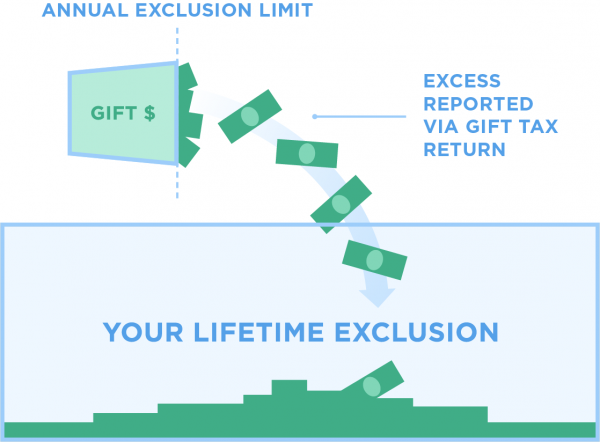Gift Tax: How It Works, Who Pays and Rates

Many or all of the products featured here are from our partners who compensate us. This influences which products we write about and where and how the product appears on a page. However, this does not influence our evaluations. Our opinions are our own. Here is a list of our partners and here's how we make money.
The gift tax limit is $16,000 in 2022 and $17,000 in 2023.
The gift tax rates range from 18% to 40%.
The gift giver is the one who generally pays the tax, not the receiver.
There are a lot of things to worry about in life, but the gift tax probably isn’t one of them.
What is the gift tax?
The gift tax is a federal tax on transfers of money or property to other people while getting nothing (or less than full value) in return. Few people owe gift tax; the IRS generally isn’t involved unless a gift exceeds the annual limit.
What is the gift tax limit for 2022?
Taxpayers could gift up to $16,000 in 2022 without having to pay the federal gift tax. The 2023 tax year (taxes filed in 2024) will have a higher limit – taxpayers will be able to gift up to $17,000 without having to pay the gift tax.
What is the gift tax rate?
The gift tax rates range from 18% to 40%, and the giver generally pays the tax. There are, of course, exceptions and special rules for calculating the tax, so see the instructions to IRS Form 709 for all the details.
How do I avoid gift tax?
Two things keep the IRS’s hands out of most people's candy dish: the annual exclusion ($16,000 in 2022 and $17,000 in 2023), and the lifetime exclusion ($12.06 million in 2022 and $12.92 million in 2023).
Stay below the annual threshold, and you can be generous under the radar. Go above, and you'll have to fill out a gift tax form when filing returns — but you still might avoid having to pay any gift tax.
How the annual gift tax exclusion works
In 2022, you could have given up to $16,000 to someone in a year without having to deal with the IRS. In 2023, this threshold is $17,000. A bit more about how that works:
If you give away more than the annual exclusion amount in cash or assets (for example, stocks, land, a new car) to any one person during the tax year, you will need to file a gift tax return in addition to your federal tax return the following year. That doesn’t mean you have to pay a gift tax. It just means you need to submit IRS Form 709 to disclose the gift.
The annual exclusion is per recipient; it isn’t the sum total of all your gifts. That means, for example, that you can give $17,000 to your cousin, another $17,000 to a friend, another $17,000 to a neighbor, and so on in 2023 without having to file a gift tax return in 2024.
If you’re married, you and your spouse could give away $17,000 each in 2023 without needing to file a gift tax return in 2024. If you want to combine your annual exclusions in order to together gift a donee up to $34,000, you can elect to take advantage of "gift splitting". The IRS has more details here.
Gifts between spouses are unlimited and generally don’t trigger a gift tax return. Though, if the spouse isn't a U.S. citizen, special rules may apply. Gifts to nonprofits are charitable donations, not gifts.
The person receiving the gift usually doesn't need to report the gift.


How the lifetime gift tax exclusion works
On top of the $16,000 annual exclusion in 2022, you get a $12.09 million lifetime exclusion. This rises to $12.92 million in 2023. And because it’s per person, married couples can exclude double that in lifetime gifts. That comes in handy when you’re giving away more than the annual exclusion amount.
“Think about buckets or cups,” says Christopher Picciurro, a certified public accountant and co-founder of accounting and advisory firm Integrated Financial Group in Michigan. Any excess “spills over” into the lifetime exclusion bucket.
For example, if you give your brother $50,000 in 2023, you’ll use up your $17,000 annual exclusion. The bad news is that you’ll need to file a gift tax return, but the good news is that you probably won’t pay a gift tax. Why? Because the extra $33,000 ($50,000 - $17,000) simply counts against your lifetime exclusion. Next year, if you give your brother another $50,000, the same thing happens: you use up your annual exclusion and whittle away another portion of your lifetime exclusion.
The gift tax return keeps track of that lifetime exclusion. So if you don't gift anything during your life, then you have your whole lifetime exclusion to use against your estate when you die. Learn more about how estate tax works.
Another trick that can help you avoid an unwanted surprise is simply keeping an eye on the calendar. In 2026, the lifetime exclusion amount will revert back to its pre-2018 level of around $5 million (as adjusted for inflation) per individual. You can find more details here.
» MORE: See how a wealth tax works
Do you pay taxes when you receive a gift?
In most cases, no. Assets you receive as a gift or inheritance typically aren’t taxable income at the federal level. However, if the assets later produce income (perhaps they earn interest or dividends, or you collect rent), that income is likely taxable. IRS Publication 525 has the details. Also, some states have an inheritance tax.
What can trigger a gift tax return
Caring is sharing, but some situations often inadvertently trigger the need to file a gift tax return, pros say.
Giving the grandkids college money
If Grandma or Grandpa put, say, $60,000 in a 529 plan for a grandchild, Picciurro gives as an example, that may trigger the gift tax exclusion because it's over the limit.
A special rule allows gift givers to spread one-time gifts across five years’ worth of gift tax returns to preserve their lifetime gift exclusion.
» MORE: Learn how inherited IRAs work
Springing for vacations, cars or other stuff
If you fork out $40,000 for Junior’s wedding, or just pay for the crazy-expensive honeymoon, get ready to do some paperwork.
If you’re paying tuition or medical bills, paying the school or hospital directly can help avoid the gift tax return requirement (see the instructions to IRS Form 709 for details).
Laid-back loans
Lending money to friends and family can be tricky, and the IRS can make it even worse. It considers interest-free loans as gifts. Or if you lend them money and later decide they don't need to repay you, that's also a gift.
Elbowing in on a non-spouse bank account
“Let’s say you live by Grandma, so for convenience, we're going to put you on Grandma's bank account. Guess what just happened?” Picciurro says. “If you're put as a joint [owner] on a bank account with somebody and you have the right to take the money out at any time, essentially Grandma is giving you a gift.”
Member FDIC |  SoFi Checking and Savings Member FDIC | Member FDIC |
|---|---|---|
| Read review | ||
APY4.00% With $0 min. balance for APY | APY3.75% With $0 min. balance for APY | APY3.50% With $0 min. balance for APY |
BonusN/A | Bonus$250 Earn up to $250 with direct deposit. Terms apply. | Bonus$200 Requirements to qualify |
» Need more guidance? See our full roundup of financial advisors.





